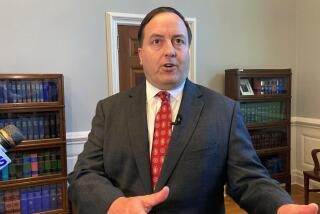2nd Firm Leaves Group Supporting Private Accounts
- Share via
WASHINGTON — A business alliance that supports President Bush’s call for private Social Security accounts lost a second corporate member Monday as a result of pressure from the AFL-CIO, which had threatened to picket the company if it did not remove itself from the group.
Waddell & Reed, a financial services company in Overland Park, Kan., withdrew from the Alliance for Worker Retirement Security, one of several business-funded organizations backing the president’s proposal to allow workers born in 1950 or later to divert a portion of their Social Security taxes to private investment accounts. The AFL-CIO and the leading organization of senior citizens, AARP, oppose the concept.
“The firm has a history of listening to its clients and being sympathetic and supportive of their issues,” John Sundeen Jr., Waddell & Reed’s chief administrative officer, wrote to the AFL-CIO. “Please accept our withdrawal as such proof.”
The company’s decision to quit the business alliance is another sign of difficulty for the Bush proposal, which has met with a less-than-enthusiastic reception on Capitol Hill and at town meetings across the country. However, backers of the proposal said the withdrawal of a second financial services firm from the alliance wouldn’t make any difference.
Sundeen sent the letter Friday, days before the AFL-CIO had planned to picket Waddell & Reed, which manages about $35 billion in mutual fund assets.
As a result, the AFL-CIO’s William Patterson said the labor organization would redirect its activity toward other companies -- such as Charles Schwab Corp. -- that had been less responsive to its request.
Patterson, who directs the AFL-CIO’s Office of Investment, said he had been in touch with dozens of companies and trade associations, urging them to back away from support for the president’s proposal.
Because labor unions control large amounts of money for investment, through pension and mutual funds and as institutional shareholders, they have strong leverage with brokerage and financial services firms.
Through a spokesman, Charles Schwab Corp. said it had no position on the president’s proposal for private accounts. The company joined the alliance simply “so we can stay current on the debate,” Schwab spokesman Glen Mathison said.
Nonetheless, the AFL-CIO plans a series of actions this week against Schwab and other companies. A separate AFL-CIO demonstration in Hartford, Conn., today will target insurance companies providing funds for business organizations that have lent support to the concept of private accounts.
The director of the business alliance, Derrick A. Max, said Waddell & Reed’s departure wouldn’t affect his plan to support the concept of private accounts, and might even help it.
He said that after brokerage firm Edward Jones & Co. withdrew from the alliance Feb. 11, in the face of picketing and online protests by unions and seniors groups, the group received offers from other donors that more than made up for the loss of Jones’ contributions. He accused the AFL-CIO of stifling honest debate about Social Security.
Max said he had already told other financial services firms in the alliance that he understood if they needed to withdraw to satisfy demands from labor.
The White House and the Republican National Committee are relying on business-funded groups to build support for private accounts. Another group directed by Max, the Coalition for the Modernization and Protection of America’s Social Security, plans to spend $20 million to back the president’s idea and has already kicked off a 16-state effort to galvanize support.
More to Read
Inside the business of entertainment
The Wide Shot brings you news, analysis and insights on everything from streaming wars to production — and what it all means for the future.
You may occasionally receive promotional content from the Los Angeles Times.










